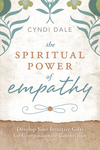Empathy as a Spiritual Power: What Type of Empath Are You?

I work with clients every day; they call from locations as far-flung as Japan and as close to home as Iowa. The reason I can provide this long-distance service as an energy medicine healer and intuitive specialist is the support of a vast network of satellites, electrical lines, and Internet connections.
Empathy works in a similar way. Typically defined as the ability to sense what's happening to another (person, animal, etc.), empathy relies on an amazingly complex set of linkages. Most researchers point to interchanges within and between the brain, various neurological systems, and psychological programming. If you back a scientist in a corner, though, they'll admit that there are unseen forces at play. I believe that these are the more interesting and productive factors to study, and that understanding the more "unusual" aspects of empathy can help you embrace the true power of being empathic.
And that's exactly what empathy is supposed to be: a power.
The "limited edition" version of empathy says there are two main types of empathy: emotional empathy and cognitive empathy. Most of us have experienced how helpful it is to sense what others are feeling or thinking. What if I were to inform you that there are actually six, not only two, types of empathy? Not only that—empathy isn't just about walking in the shoes of another. The subject of your awareness might be a person; then again, it could be a dog, plant, object, or otherworldly being. This is because empathy is actually a supersonic phenomenon that alerts us to spiritual or psychic information. As such, it can attune us to all sorts of animate or inanimate subjects, and also work for or against us.
As an example, consider the following six individuals, each of which showcases a particular type of spiritual empathy:
- Jethro is an incredibly successful veterinarian, with a huge waiting list. The reason for his popularity is that he can sense everything his animal clients are going through. But that's hard on him; he often arrives home exhausted. He wonders, too, if this sensitivity has anything to do with the fact that his life turns upside down at every full moon, he gets jittery before a storm, and he hates it when someone cuts down a tree (he can "feel it screaming").
- Molly has been inflicted with aches and pains the entirety of her life, including allergies, heart disease, and more recently, arthritis. Not a doctor has figured out why. And oh—she has this strange habit. She can touch an object and describe the person who owns it.
- Lori is so emotionally overwhelmed around people that she must work out of her home and only shops at night. On the upside, her friends insist she's the most understanding person they've ever met.
- Fred is known for his "gut sense;" he literally pulls information out of the air and is nearly always right; unfortunately, he can't always support his data with cold facts.
- Janie insists that no one likes her because she can tell if they are lying or not. On the other hand, she's brilliant in her work as a career counselor.
- Maxwell is a ten-year-old who hasn't fallen asleep "on time" since he was two; he insists that there is a "bad thing" in the room. His parents think he's making it up, although they do admit that the issue started when the mother's brother died; he was a very cruel and disturbed individual.
What do all these individuals have in common? They are "spiritually empathic." In other words, they are keenly able to sense spiritual information, also called subtle or psychic energy, which I believe is the core of empathy.
Energy is information that moves or vibrates. Everything is made of energy, from your coffee cup to a thought. As well, everything is made of information and everything vibrates—hence my definition of energy.
From an energetic point of view, there are two main types of information. There is information that moves relatively slowly. This is sensory information; and it is perceived through the everyday senses of sight, sound, touch, taste, and smell. We hear what someone is saying and we can then respond. We touch a child and know whether or nor they have a fever. There is also "extra-sensory" information, however, and this information moves faster than our five senses can track. This "psychic stuff" is comprehended through our five senses, but it enters and exits in immeasurable ways through energy centers called chakras.
Chakras are subtle organs that operate in ways similar to our physical organs, with one exceptional difference: they process information that moves quickly and slowly. Because of this, they attune us to information that we can't see, touch, hear, taste, smell, or prove with our five senses—even though it registers within our body. In other words, chakras make us spiritual or psychic.
There are many chakras. Each is linked to a different bodily region and receives and sends a specific set of information. For instance, the chakra in your hip area manages information about physicality. The chakra in your abdomen handles information about feelings. In summation, every chakra relates to a set of messages that allow you to communicate psychically or spiritually with the external world.
Chakras are the basis for the spiritual gifts, ways of knowing on the extrasensory level. There are three main families of spiritual gifts. These are verbal, visual—and yes, empathic.
The verbal gifts are often described with terms like clairaudience, telepathy, and mediumship. These aptitudes are auditory. Individuals with this gift might also be adept at speaking, writing, musicality, or intuitively understanding the written word. The main chakra related to the verbal gift lies in the throat.
The visual gifts allow pictorial communication, the visionary often seeing images, such as colors, shapes, or visions, in their mind's eye. Frequent labels for this ability are clairvoyance, prophecy, and seeing. The chief chakra related to this aptitude is located in the forehead.
The empathic gifts occupy most of the other in-body chakras and constitute the majority of subtle abilities. While the empathic gifts, and I believe any sort of empathy, involves the sharing of subtle information, the main instrument is the body. In other words, empathically sensitive individuals feel, sense, taste, smell, or simply "know" what's occurring outside of themselves.
At first blush, the empathic gifts are incredibly exciting. Wow, who wouldn't want to know everything about everyone else? Some individuals are too empathic, however. When we take more spiritual information into our bodies than we know what to do with, it's hard to separate from it. We might sense the illness of another, but it's only one more step to actually become ill as well. Because of this, empathic individuals often feel too sensitive.
What are the various empathic gifts? I organize them in six categories, and I've already introduced you to examples of these six gifts earlier in this article. Following is an overview of each gift, the person exemplified, and the location of the related chakra. As you read through my descriptions, pay attention to which categories might best describe you.
- Natural empathy: Jethro is a natural empath, attuned to the natural world. This ability can include sensing what is occurring in all natural beings, such as animals and plants, but also celestial bodies. It might also alert us to weather patterns and pretty much anything else related to the environment. When used in moderation, this gift allows us to experience nature at a deep level. If it's too extended, we can become overwhelmed by everything from animals' feelings to a shift in the moon. The related chakra lies underneath our feet.
- Physical empathy: Molly is a physical empath, which means she can sense what is happening in others' bodies as well as physical objects. The appropriate use of this gift helps us relate to others' physical ailments and needs and engages us with physical substances. If hyper-extended, we can actually absorb others' ailments and become too sensitive to the energy in physical objects. The related chakra is found in the hip area.
- Emotional empathy: As our model emotional empath, Lori senses others' feelings. This beautiful gift allows compassion and care but also emotional overwhelm, making it hard to distinguish between our feelings and those of others. The emotional chakra is in the abdomen.
- Mental empathy: Fred is a mental empath, able to intuitively read information about others. Like all mental empaths, he can also access data seemingly from "nowhere." This analytical ability assures insight into others and would do us well when taking a test, but we can get flooded with unnecessary information. The mental center anchors in the solar plexus.
- Spiritual empathy: Spiritual empaths like Janie are integrity-sensitive; they can tell if others are aligned with their value system or living their spiritual purpose. If this gift isn't fully filtered, it's easy to pick up on negative energy and become depressed. This ability is housed in the crown of the head.
- Shamanic empathy: Shamans like young Maxwell are mystical and otherworldly, able to connect with things that "go bump in the night." The shamanic can often tap into all the other empathic abilities and sometimes into the verbal and visual families as well. A shaman's gifts enable big-picture thinking and spiritual connections but can be easily overwhelming, if not frightening. This energy center is located above the head but locks into the body in the upper chest.
How do you assure the positive and uplifting use of your empathic gifts, rather than their potential downsides? I recommend taking the following steps:
- Identify your empathic abilities. Do you relate to one of the six styles—natural, physical, emotional, mental, spiritual, or shamanic—more than any others? By getting a sense of your style you can better cultivate its positive attributes.
- Embrace your gifts. After determining which gift or gifts best describe you, write down all the benefits you might enjoy by using each gift wisely and safely.
- Clarify your boundary weaknesses. I've emphasized some of the ways these gifts can leave you vulnerable to information overload. Reflect on any tendencies you have in this area. Reflect on instances that seem to trigger your sensitivities, whether they are internal, such as being tired or hungry, or external, such as being around certain people or specific environments.
- Diagnose reasons you might have unconsciously allowed your gift to become overused, if applicable. How did this help you cope in your childhood? Define your place in the world?
- Deliberately decide that you would like to screen out information that is too much for you to handle. Before we can shift our boundaries and ways of relating to our gift, we must decide we want to operate differently.
- Make a decision. Decide what information you want to let in and what you want to keep out. Ask for spiritual assistance, perhaps praying or meditating for it, to help you maintain this new position.
Finally, enjoy your empathic gifts. Every day look for new ways to use your empathy in glorious ways. It's the finest network you'll ever experience, and as shared by C. JoyBell C.: "Not to be overlooked are the senses of our souls: intuition, peace, foresight, trust, empathy."
It is these that enable our divinity, not only our humanity.

About Cyndi Dale
Related Products


is subject to certain Terms and Conditions